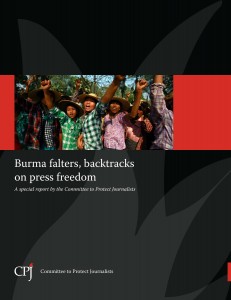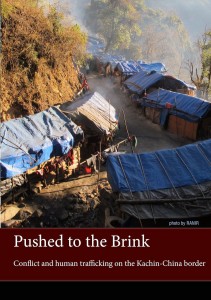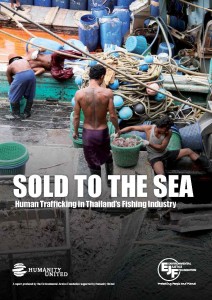Human Rights (383 found)
Trafficking in Persons Report 2013: Burma
Burma is a source country for men, women, and children subjected to forced labor, and for women and children subjected to sex trafficking in other countries. Many Burmese men, women, and children who migrate for work to Thailand, Malaysia, Indonesia, Singapore, the United States, China, Bangladesh, India, South Korea, and Qatar are subjected to conditions of forced labor or sex trafficking in these countries […]
• • •Resolution on the Situation of Rohingya Muslims
The European Parliament, having regard to its previous resolutions on Burma/Myanmar, in particular those of 20 April 2012[1], 13 September 2012[2] and 22 November 2012[3], having regard to its resolution of 23 May 2013 on reinstatement of Myanmar/Burma’s access to generalised tariff preferences[4], having regard to the EU Foreign Affairs Council conclusions of 22 April 2013 on Myanmar/Burma […]
• • •Burma Falters, Backtracks on Press Freedom
 The media landscape in Burma is more open than ever, as President Thein Sein releases imprisoned journalists and abolishes the former censorship regime. But many threats and obstacles to truly unfettered reporting remain, including restrictive laws held over from the previous military regime. The wider government’s commitment to a more open reporting environment is in doubt […]
The media landscape in Burma is more open than ever, as President Thein Sein releases imprisoned journalists and abolishes the former censorship regime. But many threats and obstacles to truly unfettered reporting remain, including restrictive laws held over from the previous military regime. The wider government’s commitment to a more open reporting environment is in doubt […]
Pushed to the Brink: Conflict and Human Trafficking on the Kachin-China Border
 On the surface, Burma seems to be strengthening its fight against human trafficking. Burma’s long-held position in the lowest ranking of international trafficking efforts finally inched upwards a rank as a result of several policy reforms and new programs. An anti-trafficking hotline opened, as did several anti-trafficking task force offices. Anti-trafficking stickers and posters are plastered in areas across the country, and American singer Jason Mraz recently teamed with MTV to hold a massive free concert in Rangoon to raise awareness about human trafficking
On the surface, Burma seems to be strengthening its fight against human trafficking. Burma’s long-held position in the lowest ranking of international trafficking efforts finally inched upwards a rank as a result of several policy reforms and new programs. An anti-trafficking hotline opened, as did several anti-trafficking task force offices. Anti-trafficking stickers and posters are plastered in areas across the country, and American singer Jason Mraz recently teamed with MTV to hold a massive free concert in Rangoon to raise awareness about human trafficking
The Kachin Women’s Association – Thailand’s earlier reports Driven Away (2005) and Eastward Bound (2008) had documented the growing incidence of trafficking along the China-Burma border. This new report looks at the impacts of the renewed conflict on this problem […]
Sold to the Sea: Human Trafficking in Thailand’s Fishing Industry
 Human trafficking is a global problem. It is estimated that as many as 27 million men, women and children are currently victims of human trafficking around the world.
Human trafficking is a global problem. It is estimated that as many as 27 million men, women and children are currently victims of human trafficking around the world.
Thailand is the 32nd largest economy in the world, with a GDP of $377 billion and a growth rate of 5.5 per cent in 2012.2/3 It also has one of the lowest unemployment rates globally, at 0.5 per cent in December 2012.
Thailand’s economy is heavily reliant on labour-intensive industries. However, growing economic prosperity since the late 1980s has seen a decline in the available Thai workforce needed to meet the labour demand.5 In 2009, Thailand’s Ministry of Labour estimated that an additional 116,000 workers would be needed to address the labour-market imbalance […]
• • •Annual Report 2013: Myanmar
Amid ongoing political, legal and economic reforms, the authorities released hundreds of prisoners of conscience; however, many remained behind bars. Security forces and other state agents continued to commit human rights violations, including unlawful killings, excessive use of force, arbitrary arrests, torture and other ill-treatment, and unlawful confiscation […]
• • •Massacre in Central Burma Muslim Students Terrorized and Killed in Meiktila
This report details the results of a PHR investigation into the March 20 and 21, 2013, attacks on Muslim students, teachers, and residents in the Mingalar Zayyone quarter of Meiktila, a small town in central Burma. A two-person team from PHR conducted 33 interviews about the attacks, which resulted in the deaths of at least 20 children and four teachers […]
• • •Update of Human Right Violations by the Burma Army During Offensives in Palaung Areas (March and April 2013)
Since January 2013, Burmese government troops have been carrying out military offensives in Palaung areas against the Shan State Army-North (SSA-N), Kachin Independence Army (KIA) and Ta’ang National Liberation Army (TNLA). The Burmese troops have committed widespread human rights violations during these operations […]
• • •Gains Need Consolidation in Landmark Year for Change in Burma
This report summarizes the current state of press freedom and freedom of expression in Burma, as a part of SEAPA’s report “Southeast Asia Press Freedom Challenges for 2013.” It examines the expanding space for media in the country, increasing journalist solidarity and the turbulent transition that still lays ahead, especially when it comes to divisive issues such as violence against Muslims. In summary, the reforms have not yet been institutionalized and the government still seems bent to retain control of the press and right to freedom of opinion and expression […]
• • •Burma: Visit report
 Burma today is on a knife-edge of hope and fear. For the first time in more than two decades, there are real reasons for cautious optimism about the prospects of freedom and democracy in Burma. Over the past eighteen months, significant reforms have been introduced by President Thein Sein which have resulted in the release of the majority of political prisoners, the election of Daw Aung San Suu Kyi and 42 of her colleagues in the National League for Democracy (NLD) to Parliament, significantly increased freedom for the media, civil society and political actors, and improvements in freedom of expression. The agreement of preliminary […]
Burma today is on a knife-edge of hope and fear. For the first time in more than two decades, there are real reasons for cautious optimism about the prospects of freedom and democracy in Burma. Over the past eighteen months, significant reforms have been introduced by President Thein Sein which have resulted in the release of the majority of political prisoners, the election of Daw Aung San Suu Kyi and 42 of her colleagues in the National League for Democracy (NLD) to Parliament, significantly increased freedom for the media, civil society and political actors, and improvements in freedom of expression. The agreement of preliminary […]

 All posts
All posts